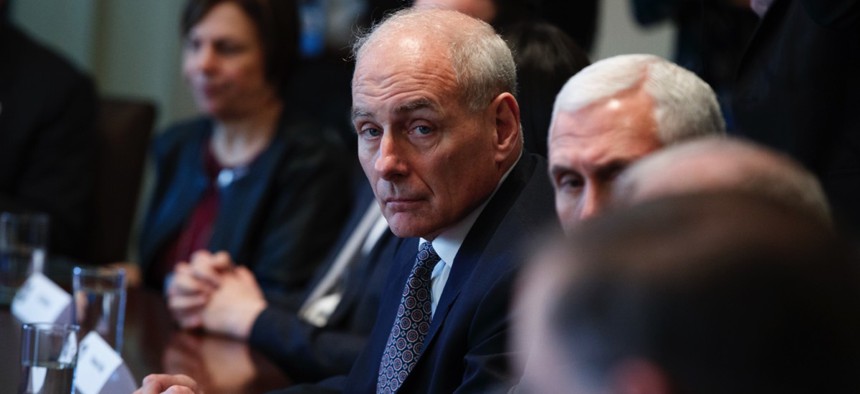The Trump Administration’s Mixed Messages on ‘Sanctuary Cities’ Continue

Homeland Security Secretary John Kelly. Evan Vucci / AP Photo
City Halls now want a legal definition of the term, with Seattle even suing for one.
WASHINGTON — Several U.S. mayors called for a federal definition of what constitutes a “sanctuary city”, after a Wednesday morning meeting with U.S. Homeland Security Secretary John Kelly left them reconciling mixed messages within the Trump administration.
U.S. Attorney General Jeff Sessions’ hardline push to withhold, terminate, ban and claw back Department of Justice grants to jurisdictions refusing to enforce federal immigration law contrasts starkly with Kelly’s more measured approach. It’s become akin to a bad cop, good cop routine.
The Department of Homeland Security intends to determine how federal funds could be affected by a sanctuary cities legal definition, which requires looking at immigration laws on the books and programs already in existence before making any decisions, said department spokesman David Lapan.
“I think there are different messages being communicated from other parts of the administration,” said Oklahoma City Mayor Mick Cornett, who serves as the current president of the U.S. Conference of Mayors that met with Kelly Wednesday morning.
Cornett was open to cities assisting Kelly in defining sanctuary cities, adding he didn’t “see a lot of misalignment between what DHS and police chiefs are implementing on the streets today,” in terms of deporting undocumented criminals.
The department is considering how best to give communities advance notice—when Immigration and Customs Enforcement issues detainer requests for undocumented immigrants in local police custody—to boost compliance, Lapan said. But mayors pushed back against the notion that declining a detainer constitutes violating federal immigration law.
At issue is the fact the federal government is not providing local law enforcement with warrants for undocumented immigrants’ re-arrests, which should be “very easy” to do, said Austin Mayor Steve Adler. Both his city and Travis County, which includes Austin, comply with state and federal immigration laws but not with warrantless detainer requests, he added.
Making unlawful detainer compliance a condition of Justice Department grants is worrisome to mayors and police chiefs. DHS will take a look at adding language to grants to make that condition clear, Lapan said, acknowledging currently withholding grants could be unfairly retroactive to cities.
For this reason, Seattle Mayor Ed Murray announced Wednesday afternoon the city is suing the federal government, arguing President Trump's executive order threatening to strip funding from uncooperative jurisdictions is unconstitutional under the 10th Amendment—attempting to force local law enforcement into enforcing federal immigration law. The suit further asserts Seattle hasn't violated federal law because, rather than prohibiting information sharing, the city simply bars inquiry into peoples' immigration status.
“Seattle will not be bullied by this White House or this administration and today we are taking legal action against President Trump’s unconstitutional order,” Murray said in a statement . “We have the law on our side: the federal government cannot compel our police department to enforce federal immigration law and cannot use our federal dollars to coerce Seattle into turning our backs on our immigrant and refugee communities. We simply won’t do it."
Murray's office said the city's budget is in limbo with federal funding in doubt.
The negative effects of refusing cities grants would be felt at both the local and federal level, warned Tom Manger, the police chief in Montgomery County, Maryland, who is also the president of the Major Cities Chiefs Association .
“We don't have the resources to be the immigration police nor in jurisdictions with large immigrant populations … would that be prudent,” Manger said, though he called the short, introductory meeting with Kelly a “productive first start.”
Last month, Murray sent a 13-page request to the Trump administration asking for a detailed definition of a “sanctuary city” and threatened to sue the federal government for open records violations on the matter.
Lapan stressed DHS has no timeframe for developing a comprehensive legal definition of sanctuary cities and cautioned against “causing panic.” He denied several reports ICE was going into schools or churches, or even waiting outside them, to make arrests of undocumented immigrants.
While Los Angeles Police Chief Charlie Beck said it was “too soon” to blame the Trump administration for the chilling effect such stings have on immigrants’ willingness to report crimes, he noted a 25 percent drop in the reporting of sexual assaults among Hispanics in his city since January. The number of Hispanics reporting domestic assaults was also down.
“That does not correlate with any other demographic,” Beck said.
One of Kelly’s top priorities is discouraging undocumented immigrants “from making the very dangerous journey” across the southwestern border, Lapan said. Trump went so far as to credit Kelly on Sunday with the decrease in undocumented immigration, which actually began under the Obama administration .
“It’s too soon to tell why that is,” Lapan said, contradicting the president.
Mayors were heartened by Kelly’s focus on deporting undocumented criminals and not Deferred Action for Childhood Arrivals recipients, whose parents brought them to the country illegally as children. But Kelly made no commitments, Adler said.
“We’re not going to resolve mixed messages in the administration [in one meeting],” Adler said. “It seems as if the focus is going after cities that are violating federal law, which I would support … That does not happen to be Austin or Travis County or any of the cities in the room today.”
Editor's Note: This article was updated to include new developments on Seattle's legal action.
Dave Nyczepir is a News Editor at Government Executive’s Route Fifty and is based in Washington, D.C.
NEXT STORY: How Stockton Is Using Predictive Policing to Thwart Violent Gun Crimes






